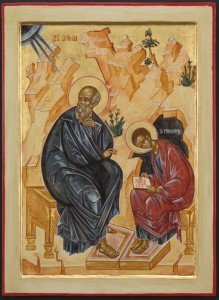 I have been sharing thoughts about the Gospel of John during the past several weeks. This week I would like to share thoughts about the beginning of John’s Gospel, the Prologue, since we will be hearing it next weekend on the Great Day, Pascha.
I have been sharing thoughts about the Gospel of John during the past several weeks. This week I would like to share thoughts about the beginning of John’s Gospel, the Prologue, since we will be hearing it next weekend on the Great Day, Pascha.
Whereas Matthew and Luke begin their stories of Jesus with his birth and Mark with John the Baptizer, John begins his with creation – indeed, before creation. His gospel opens with a magnificent prologue that is perhaps an adaptation of an early Christian hymn. Its first words are the same as the first words of Genesis: “In the beginning.” The allusion is deliberate, not accidental.
The prologue of John’s Gospel continues. What was in the beginning was the Word, and the Word was with God, and the Word was God. The Greek word translated into English as word is logos, sometimes capitalized. In Greek philosophy, the logos referred to the principle of reason ordering the universe. It was the opposite of chaos. Though John’s meaning might include this, his context was thoroughly Jewish. Within Judaism, God created by word, speaking the world into being. Prophets spoke the word of the Lord, God’s countercultural word and also promise-filled word.
The word of God in Judaism is closely associated with the wisdom of God, especially in documents written in the five hundred years or so before Jesus, some of them perhaps more or less contemporary with Him. There the wisdom of God and the word of God become virtually nterchangeable. God created the world through wisdom, wisdom spoke through the prophets, and wisdom (like the Spirit of God) permeates everything. In both Hebrew and Greek, the word for wisdom is grammatically feminine, and in Jewish writings about the wisdom of God, wisdom is often personified as a woman, commonly called Sophia in scholarship today.
Given the equivalence between the word and wisdom of God, John could just as well have written, In the beginning was Wisdom, and Wisdom was with God, and Wisdom was God. But John chose the word logos, a masculine noun in Greek, even though what is meant is without gender and beyond gender. And so the text continues with the masculine pronoun: He was in the beginning with God. Furthermore, he was not only with God, but active in the process of creation: All things came into being through Him (the Word), and without Him not one thing came into being. If John had written about the wisdom of God rather than the word of God, the pronouns would have been feminine.
When you listen to the Gospel proclaimed on Pascha, think about this. John is saying that the Word of God is Jesus and God created everything by the Word. It is here that we begin to see the formulation of the doctrine of the Trinity. The Creator spoke the Word and all was created
